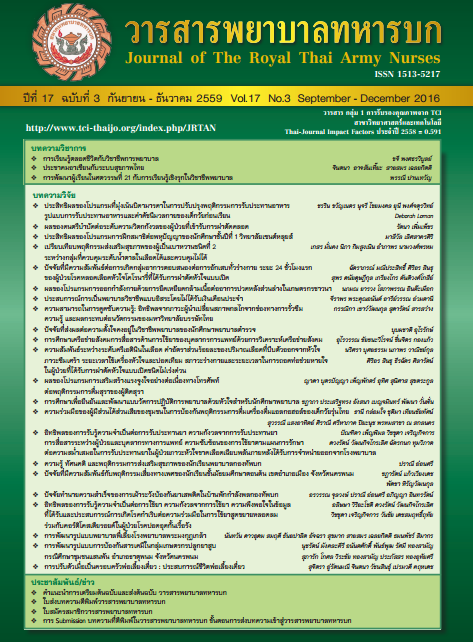ประสิทธิผลของโปรแกรมที่มุ่งเน้นบิดามารดาในการปรับปรุงพฤติกรรม การรับประทานอาหาร รูปแบบการรับประทานอาหาร และค่าดัชนีมวลกายของเด็กวัยก่อนเรียน
Keywords:
โปรแกรมที่มุ่งเน้นบิดามารดา, พฤติกรรมการรับประทานอาหาร, รูปแบบการรับประทานอาหาร, ค่าดัชนีมวลกาย, เด็กวัยก่อนเรียน, Parent-focused intervention, Eating behavior, Eating patterns, Body mass index, Preschool childrenAbstract
การวิจัยเชิงทดลองแบบสุ่มครั้งนี้มีวัตถุประสงค์เพื่อศึกษาประสิทธิผลของโปรแกรมที่มุ่งเน้นบิดามารดาต่อพฤติกรรมการรับประทานอาหารรูปแบบการรับประทานอาหาร และค่าดัชนีมวลกายของเด็กไทยวัยก่อนเรียนกลุ่มตัวอย่างเป็นบิดามารดาและบุตรวัยก่อนเรียนจำนวน 35 คู่ กลุ่มทดลองและ 30 คู่ กลุ่มควบคุมกลุ่มทดลองได้รับโปรแกรม 7 สัปดาห์ ๆ ละ 1 ครั้ง เครื่องมือวิจัยได้แก่ แบบสอบถามพฤติกรรมการรับประทานอาหาร และแบบสอบถามความถี่และปริมาณการรับประทานอาหารสำหรับเด็กฉบับภาษาไทยทั้งสองกลุ่มได้รับการประเมิน 3 ครั้งคือก่อนการทดลอง สัปดาห์ที่ 8 และ 12 หลังการทดลองเครื่องมือวิจัยมีค่าความเชื่อมั่นอยู่ระหว่าง .77 - .85 บันทึกอายุ น้ำหนัก และความสูงของเด็กเพื่อใช้คำนวณค่าดัชนีมวลกายสถิติพรรณนา การทดสอบที และการวิเคราะห์ความแปรปรวนแบบวัดซ้ำใช้เพื่อวิเคราะห์ข้อมูลผลการวิจัยพบว่าเด็กวัยก่อนเรียนที่ได้รับโปรแกรมมีพฤติกรรมการรับประทานอาหารดีกว่าเด็กในกลุ่มควบคุม และมีรูปแบบการรับประทานอาหารที่ไม่เหมาะสมของเด็กวัยก่อนเรียนในกลุ่มทดลองลดลงอย่างมีนัยสำคัญ อย่างไรก็ดีค่าดัชนีมวลกายสำหรับอายุเด็กระหว่างกลุ่มทดลองและกลุ่มควบคุมไม่แตกต่างกัน จากผลการวิจัยนี้มีข้อเสนอแนะว่าการมีส่วนร่วมของบิดามารดาสามารถช่วยปรับปรุงพฤติกรรมการรับประทานอาหาร และรูปแบบการรับประทานอาหารในเด็กวัยก่อนเรียน
The Effectiveness of a Parent - Focused Intervention on Eating Behavior and patterns and BMI among Thai Preschool Children
This randomized control trial examined the effectiveness of the parent-focused intervention on Thai preschool children’s eating behaviors and patterns and child body mass index for age (BMI-for-age). Thirty-five parent-child dyads in the control group and 30 dyads were recruited. The intervention group participated in a seven-week parent-focused intervention. The Thai versions of the CEBQ and the modified FFQ were used to measure eating behaviors and eating patterns at three time points : Baseline, week 8 and week 12 after the intervention. Cronbach’s alphas ranged from .77-.85. The Child age, weight, and height were used to calculate their BMI-for-age. Descriptive statistics, t-test, and repeated measures. ANOVAs were used to analyze the data. Results showed that preschool children who received the parent-focused intervention had better eating behaviors than those who did not receive the intervention. Within the intervention group, inappropriate eating patterns significantly decreased by time. No difference was found for BMI-for-age between groups. These findings suggest that parents’ involvement can help improve eating behaviors and patterns among overweight and obese preschool children in Thailand.
Downloads
Downloads
How to Cite
Issue
Section
License
บทความหรือข้อคิดเห็นใดใดที่ปรากฏในวารสารพยาบาลทหารบกเป็นวรรณกรรมของผู้เขียน ซึ่งบรรณาธิการหรือสมาคมพยาบาลทหารบก ไม่จำเป็นต้องเห็นด้วย
บทความที่ได้รับการตีพิมพ์เป็นลิขสิทธิ์ของวารสารพยาบาลทหารบก
The ideas and opinions expressed in the Journal of The Royal Thai Army Nurses are those of the authors and not necessarily those
of the editor or Royal Thai Army Nurses Association.






